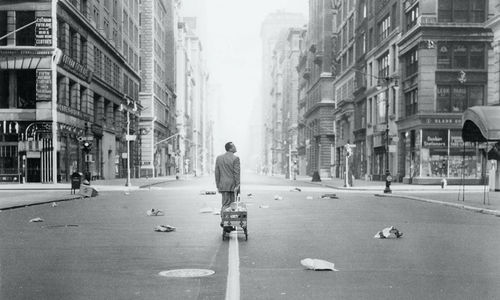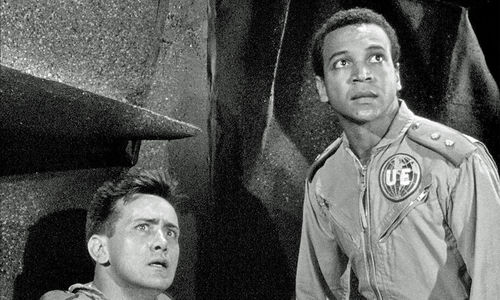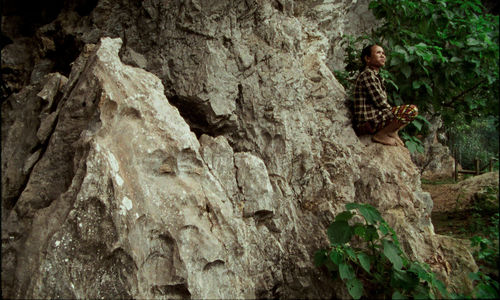
Tech Decay: Neptune Frost
- This is a past program
Presented by the UCLA Film & Television Archive.
Part of the UCLA Film & Television Archive screening series Science Fiction Against the Margins. Learn more at cinema.ucla.edu.
In-person: Introduction by filmmaker Asuka Lin. Q&A with filmmakers Saul Williams and Anisia Uzeyman, moderated by Public Programmer Beandrea July.
After years of use and misuse, the technological materials we rely on to communicate become obsolete and are thrown away to rot. This program imagines the post-tech era in which these discarded materials take their own course, at times seeking revenge against their creators. Toxic and deadly mining of coltan used to power lithium batteries sets the scene in Neptune Frost. Core Dump — Dakar tracks the effects on humans scavenging and melting minerals for resale, and in A.I. Mama, recycled scraps of tech are assembled to revive forgotten dreams. These narratives surrounding postconsumer tech products shine a light on human efforts to create, control and destroy methods of communication.
A.I. Mama (2020)
In A.I. Mama’s cyberpunk, Super 8, lo-fi world, Kei, a computer hacker, attempts to create their late mother through A.I. coding. Fueled by a childhood nostalgia to be nurtured, memories of their mother clash with a clutter of tech waste. Cables and wires take over, blending machine and human into a chaotic heap.
DCP, b&w, 5 min. Director: Asuka Lin. With: Kei.
Core Dump — Dakar (2018)
Chapter one of a four-part series, Core Dump — Dakar tracks the flow of technological materials from production to e-waste. Set in Dakar, the first segment starts at the end, examining the e-waste that ends up in African nations such as Senegal after having been sold and consumed by predominately Western countries. E-waste acts as “radioactive fossils,” telling the story of their creation and the impact on the civilians living amid this detritus. In a cyberpunk aesthetic, a robot-human hybrid narrates the current state of the technology chain and its unsustainable loop.
DCP, color, in French with English subtitles, 12 min. Director: Francois Knoetze.
Neptune Frost (2021)
The black ore coltan contains heavy earth metals that are essential in electronics manufacturing, especially cellphones and computers. But extraction of the resource involves human rights violations and environmental degradation in the African nations in which it is found. The sci-fi punk musical Neptune Frost follows a group of exiled coltan miners and other outcast “hackers” who form an anti-capitalistic community in the hills of Burundi. Matalusa — a.k.a. Martyr Loser King — a coltan miner whose brother is killed by a mine supervisor, finds himself in this new community, where he discovers a strong connection with fellow outcast and intersex character Neptune. The film weaves themes of worker resistance, queer struggles and their intersections through poetry and music.
Artist and musician Saul Williams, who had worked in film as an actor and writer, made his directorial feature debut with Neptune Frost, co-directing with Anisia Uzeyman, who also was the director of photography. Originally set to be a graphic novel, the film project went into production in 2016 in neighboring Rwanda due to political unrest in Burundi that prevented shooting on location. Refugee musician Kaya Free, who stars as Matalusa, had recorded the murder of a protestor in Burundi before fleeing to Rwanda. Other Burundi refugees make up the cast and crew of the film, and their stories of resistance and survival wove their way into the storyline, filling in the emotional power Uzeyman and Williams’ narrative sought to highlight. The film’s songs are pointed, speaking of Burundi student protests and the cycle of human labor and abuse involved in mining for products used in the technology that powers the media. Neptune Frost offers some hope in a locale lit up by neon lights and repurposed cables. It is, after all, love and music that power the outsiders’ village.
DCP, color, in Kinyarwanda, Kirundi, Swahili, French and English with English subtitles, 110 min. Directors: Saul Williams, Anisia Uzeyman. Screenwriter: Saul Williams. With: Cheryl Isheja, Elvis Ngabo, Kaya Free.
The UCLA Film & Television Archive is a division of UCLA Library, and presents its public programs in the Billy Wilder Theater at the Hammer, among other venues. For more information about the Archive, visit cinema.ucla.edu.
ATTENDING THIS PROGRAM?
Ticketing: Admission to Archive screenings at the Hammer is free. Your seat will be assigned to you when you pick up your ticket at the box office. Seats are assigned on a first come, first served basis, limit one per visitor. Box office opens one hour before the event. Questions should be directed to the Archive at programming@cinema.ucla.edu or 310-206-8013.
Member Benefit: Subject to availability, Hammer Members can choose their preferred seats and pick up tickets for one additional guest. Members receive priority ticketing until 15 minutes before the program. Learn more about membership.
Parking: Self-parking is available under the museum. Rates are $8 for the first three hours with museum validation, and $3 for each additional 20 minutes, with a $22 daily maximum. There is an $8 flat rate after 5 p.m. on weekdays, and all day on weekends.
Read our food, bag check, and photo policies.
Read our COVID-19 safety guidelines.













